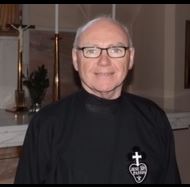On the 2nd Sunday of Lent, which always tells the story of the Transfiguration of Jesus on Mount Tabor, I tend to think of mountains where I’ve walked. I say walked, rather than climbed, as I always preferred to find the gentler ascents, and to be there for the beauty rather than the challenge. When Father Gareth and Brother Antony returned from Highgate last week, having thoroughly enjoyed their time there with the other students, they told me that they had been talking to an English Passionist, Father Ben, someone I knew well from years past. Father Ben had recently returned to London after spending some years ministering in the diocese of Galloway, but that wasn’t his first stint in Scotland. For 4 years, back in the late 1990’s, he had lived in Kingussie where he looked after the parishes of Kingussie, in the diocese of Argyle and the Isles, and the parish of Aviemore, in the diocese of Aberdeen.
His primary reason for being there, though, was to take time in a quiet place, with little distraction, to try and decipher the diaries of Father Ignatius Spencer, a 19th century Passionist priest, whose cause for Canonization Father Ben has been pursuing relentlessly for many years. The task was made all the more difficult because Father Ignatius’s handwriting was so tiny, at times managing to cram 6 months of entries into a single page. Part of the interest surrounding Father Ignatius Spencer is that he was an ancestor of both Winston Churchill and Princess Diana Spencer, as well as in his own time being a nephew of the Duke of Wellington. Those, however, aren’t reasons to be canonised. The main thrust for that, in the mind of Father Ben, is that as well as being a holy Passionist, and a diligent priest, he was 120 years ahead of his time in his work for Christian Unity. He converted from Anglicanism and spent his life working for the conversion of England to the Catholic faith. He is also known as the Apostle of Prayer for England.
The house where Father Ben was staying during this time was the parochial house in Kingussie, where it seems that Canon Sydney MacEwan lived for a while. The attic contained some items that may have belonged to him back in the day. Canon Sydney MacEwan was the famous singing priest, perhaps best known for Bring Flowers of the Rarest which is still often played on our radios to mark the first day of May. Interestingly enough, he was born and grew up in Springburn, the neighbouring parish to St. Mungo’s, and his father was from Partick, where I was born and grew up myself. He once said “I think I prefer a concert audience to a congregation. People listen to me more attentively in a concert than in a church”. But everything he did, including his singing, was really for Christ and for the Church, and we’ll forgive him that he went to St. Aloysius and not to St. Mungo’s, and that at one time he wanted to be a Jesuit and not a Passionist.
During his years there, deciphering the diaries, Father Ben found it hard to get away for a break and so, two years in a row, and being based in Prestonpans at that time, I gave up part of my summer to cover for him, so that he could get away. To be honest, it was no great sacrifice. Being younger and fitter back then, I loved to do a bit of walking in the mountains, and from this house in Kingussie, without even taking the car, I could stay on the same side of the road and, within minutes, be walking in the Cairngorms, or I could cross to the other side of the road and, within minutes, be walking in the Monadhliaths, two ranges in the Grampians. I walked in these mountains every day I was there, and I often had my breath taken away by beauty, which I always like to think of as Transfiguration moments.
Father, your Servant, Father Ignatius Spencer, spent his life preaching the love shown for us in the Sacred Passion of your Son, and working tirelessly to bring people to know that love. Help us to follow his example and show us that you are well pleased with his life by granting any favours we ask, through his intercession. Amen.

 RSS Feed
RSS Feed
